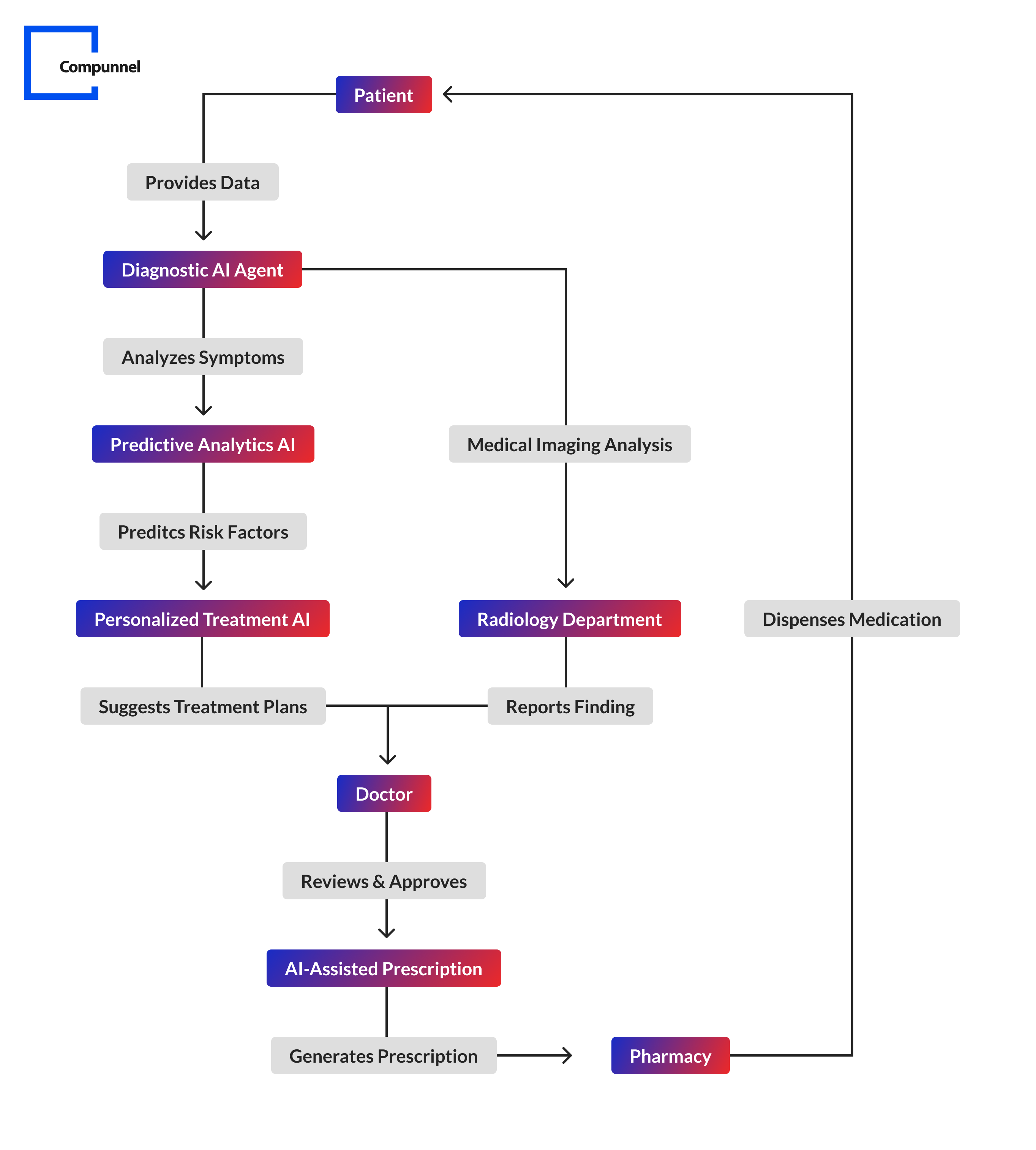How EOR Simplifies Remote Team Compliance in 2025
Introduction: Compliance at the Crossroads of Global Work Remote work has gone from a temporary fix to a long-term strategy.…

Generative AI is revolutionizing healthcare at an unprecedented pace since they leverage AI Agents and the Multi AI Agent System for diagnosis, treatment, and patient care. Specifically, generative AI can unlock fresh medical insights, automate tasks, enhance decision-making, and make healthcare more accessible and efficient. Here are ten real-world applications of generative AI in healthcare today saving many lives.
Diagnostic systems powered by AI can often detect diseases at an early stage-long before visible symptoms appear. Multi AI Agent Systems make it possible to analyze medical images, pathology slides, and genomic data to specify disorders like cancer, Alzheimer’s, and rare genetic disorders with much broader informational coverage and greater specificities. These tools in the form of AI are helping doctors to table diseases with better speed and treatment initiation, increasing survival rates.
AI agents are effectively assisting healthcare professionals by automating some administrative chores, allowing doctors to devote more time to caring for patients. A virtual assistant built on generative AI can generate medical notes, draft prescriptions, summarize patients’ histories, and even manage follow-up scheduling. These AI systems vastly lessen the administrative burden on medical professionals while assuring accuracy and compliance with healthcare standards.
AI Agent Systems are utilized by pharma companies for speeding up the drug discovery and development process. Generative AI models process biological data, simulate molecular interactions, and propose new drug candidates in a fraction of the time necessitated by traditional methods. Such AI-driven approaches have seen the potential of developing prospective drugs for diseases like COVID-19, cancer, and rare genetic disorders by companies like Insilico Medicine and DeepMind’s AlphaFold.
Every patient is unique, and AI agents facilitate the development of individualized treatment paradigms based on genetic, lifestyle, and medical histories. Applications of generative AI in healthcare analyzes vast datasets to suggest optimal dosing of drugs, predict individual responses to treatments, and generate individualized health plans. This is immensely beneficial for oncology where personalized therapies powered by AI have improved patient outcomes.
Agentic Reasoning in Generative AI Multi AI Agent Systems with agentic reasoning features are revolutionizing the decision-making process in medicine. These systems assist healthcare providers by analyzing multiple data sources, generating predictions based on those data, and offering suggested courses of action based on real-time data. For instance, in intensive care units, AI-driven multi-agent systems give doctors real-time assistance by helping them make quick, data-informed decisions on ventilator settings, dosing medications, and emergency interventions.
Generative AI is bringing radiology to trouble-free living as far as image quality and analysis speed. AI Agents can generate enhanced MRI and CT scans, heighten the resolution of an image, and observe irregularities that formerly would have slipped by unnoticed by human eyes. It fits cracks, tumors, and neurological disorders, particularly well.
Multi AI Agent Systems support healthcare professionals in predicting future disease outbreaks, deterioration of a patient’s condition, or progression of chronic illnesses. AI models analyze patient records, environmental factors, and genetic markers to give an early warning of possible outbreaks and provide advice on preventive care. Hospitals are leveraging predictive modeling to enhance patient outcomes and reduce their readmission rates.
AI driven robotic systems assist in carrying out complex surgical procedures with better precision and lesser risk of errors from human handlings. AI Agents support surgeons with real-time guidance, monitoring vitals, and even predicting complications during surgery. Robotic-assisted surgeries are gaining more prominence in orthopedic, cardiovascular, and neurosurgical procedures.
Azure is at the forefront of generative AI integration into healthcare. AI-Powered solutions such as Health Bot, Cognitive Services, and Azure OpenAI services are enabling healthcare providers to operate smoothly, improve diagnostics, and enhance patient experiences. Hospitals and research institutes utilize Azure AI to secure and expedite large amounts of medical data.
We can anticipate the following as AI agents and Multi AI Agent Systems evolve:
While challenges like ethical concerns, data privacy, and regulatory compliance remain, generative AI has the potential to make healthcare more accurate, efficient, and patient-centric.
Generative AI is not merely a contrivance of future work; it provides vibrant life-saving interventions in health care. Genie-from-AI evaluations and treatment protocols, robot-led surgical procedures, and pharmaceutics are engaged through multi-faceted or multi-agent living tools, thus ensuring that their patients live. With the growing technical advances, a series of wondrous innovations would cast the shadows for making future medicine a new starter for generations to come.
Compunnel’s Multi AI Agent Systems in medicine create unmatched value through streamlining their diagnosis, enhancing their therapy, and improving the outcome results of the patients. These intelligent agents work together to automate and improve processes like disease prediction, personalized medicine, AI-based diagnostics, and virtual healthcare assistant. In streamlined mode, this AI-driven solution utilizes predictive analytics, agent-based reasoning, and cloud-based AI like Microsoft Azure to facilitate rapid decision-making for healthcare professionals. The platform enhances workflow, trims operating costs, and ultimately transforms patient care by allowing real-time, data-driven insights to revolutionize the healthcare ecosystem.
AI application in healthcare are early diagnostics for cardiovascular diseases, the assistance of doctors by virtual assistance, drug discovery, personalized medicine, predictive analytics and strategies, image analysis, robotically operated surgeries, and real-time data driving through AI agents.
Multi-agent systems applied in healthcare optimize diagnosis, real-time decision-making, predictive analytics, personalized treatment, medical imaging, and virtual assistance by integrity checking data, simplification of procedures, improving accuracy in processes and enhancing patient care outcomes.
Multi-agent systems accelerate healthcare with real-time diagnosis, decision-making processes and advice, predictive analytics, personalized treatments, and imaging, availing data-driven informative elements in optimizing patient care and efficient streamlining of medical processes.
Compunnel creates value in healthcare with Multi AI Agent Systems by helping to enhance diagnosis, personalized medicine, predictive analytics, and virtual assistance. AI-based solutions thus improve workflows, lower costs, and provide real-time insights for better patient care and outcomes.
Discover how generative AI changes healthcare with real-time insights, enhanced diagnosis, and better patient care. Book a meeting with our experts at HIMSS 2025 to learn about how our AI-driven solutions can revolutionize your operation.
